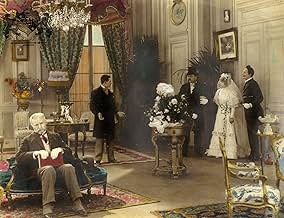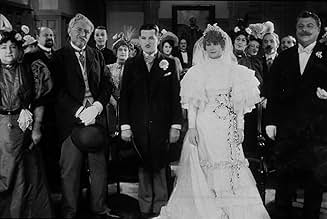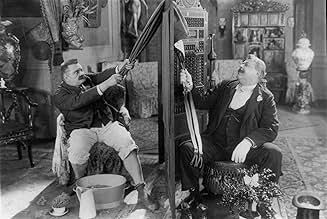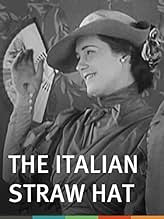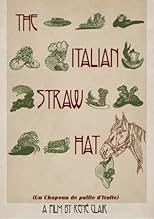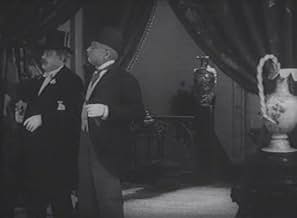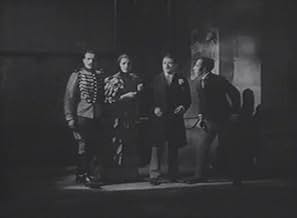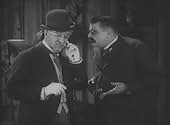On his way through the woods to his marriage, Fadinard's horse eats the hat of a married lady spending here a few moments with her lover. Fadinard has to find the very same rare hat to avoid... Read allOn his way through the woods to his marriage, Fadinard's horse eats the hat of a married lady spending here a few moments with her lover. Fadinard has to find the very same rare hat to avoid her dishonor. This will greatly disturb his own marriage.On his way through the woods to his marriage, Fadinard's horse eats the hat of a married lady spending here a few moments with her lover. Fadinard has to find the very same rare hat to avoid her dishonor. This will greatly disturb his own marriage.
- Director
- Writers
- Stars
Alice Tissot
- Une cousine
- (as Mme Alice Tissot)
Alexej Bondireff
- Un cousin
- (as M. Alexis Bondi)
Marise Maia
- La mariée
- (as Mlle Maryse Maia)
Yvonneck
- Nonancourt
- (as M. Yvonneck)
Louis Pré Fils
- Cousin Bobin
- (as M. Pré fils)
Albert Préjean
- Fadinard, le marié
- (as M. Albert Préjean)
Geymond Vital
- Le lieutenant Tavernier
- (as M. Vital Geymond)
Olga Tschechowa
- Anaïs de Beauperthuis
- (as Mme Olga Tschekova)
Paul Ollivier
- L'oncle Vézinet
- (as M. Paul Olivier)
Alex Allin
- Félix
- (as M. Alex Allin)
André Volbert
- Le maire
- (as M. Volbert)
Jim Gérald
- Beauperthuis
- (as M. Jim Gérald)
Lya Christy
- Une invitée de la noce
- (as Christie)
Nino Constantini
- Un invité de la noce
- (as Nino Costantini)
A. Debriège
- Une invitée de la noce
- (as Albany Debriège)
- Director
- Writers
- All cast & crew
- Production, box office & more at IMDbPro
Featured reviews
I have to confess that I was left bemused by the warm, not to say rapturous, audience comments I overheard when leaving the cinema. I can easily credit that it benefits from a live accompaniment rather than whatever music was applied to the soundtrack on a home video release -- but I found the pacing of the film slow and verging on funereal, the plot a strained farce revolving around a comedy of 19th-century manners already outdated in the 1920s, and the characters so unsympathetic that I caught myself feeling gratified when it looked as if the seething husband was about to blow the deception wide open. There were times when I was in sympathy with the gentleman sitting at the end of my row, who intermittently let out choked snores before jerking awake.
The film has its moments, but overall I found it disconcertingly tedious -- shots seem to be repeated and lingered upon beyond humour, and for no clear reason. The opening scenes are a pretty fair sample of the pacing and style throughout, as the various members of the bridal party experience problems in dressing, in a sequence that feels as if it extends a good five minutes: it's mildly amusing, but it's mainly 'situation' comedy in which the characterisations themselves are supposed to be funny rather than anything they actually do, and it goes on and on. Similarly, in the finale, after the plot is unravelled in what seems intended to be the end, a series of half a dozen impressionistic epilogues follow one after another, with no sign of when the film is ever going to stop...
The mechanics of the farce depend on stock characters: the endlessly-fainting lady, the insanely insistent lover, the stone-deaf old man. Gags that are eventually funny -- e.g. the mass adjustment of ties during the civil ceremony -- are built up to via enormous layering and labouring of detail. The idiom is, I suspect, to me a basically alien one; but it's the timing that really hurts as far as entertainment goes. I don't care for slapstick, but this film goes to the opposite extreme -- clearly too sophisticated for my uncultured taste to handle.
The film has its moments, but overall I found it disconcertingly tedious -- shots seem to be repeated and lingered upon beyond humour, and for no clear reason. The opening scenes are a pretty fair sample of the pacing and style throughout, as the various members of the bridal party experience problems in dressing, in a sequence that feels as if it extends a good five minutes: it's mildly amusing, but it's mainly 'situation' comedy in which the characterisations themselves are supposed to be funny rather than anything they actually do, and it goes on and on. Similarly, in the finale, after the plot is unravelled in what seems intended to be the end, a series of half a dozen impressionistic epilogues follow one after another, with no sign of when the film is ever going to stop...
The mechanics of the farce depend on stock characters: the endlessly-fainting lady, the insanely insistent lover, the stone-deaf old man. Gags that are eventually funny -- e.g. the mass adjustment of ties during the civil ceremony -- are built up to via enormous layering and labouring of detail. The idiom is, I suspect, to me a basically alien one; but it's the timing that really hurts as far as entertainment goes. I don't care for slapstick, but this film goes to the opposite extreme -- clearly too sophisticated for my uncultured taste to handle.
10insomnia
I recently saw "The Italian Straw Hat" for the second time; on the silver screen yet! The plot is simple.A horse chews up a lady's straw hat.Her escort demands that it be replaced. This leads to all manner of complications. Slight? Perhaps. Funny? Absolutely hilarious - with not a word spoken!! If any reader gets a chance to see this film, or Clair's 'American' films - "The Ghost Goes West", "And Then There Were None", and: "I Married A Witch" - DO!
It has been a few years since I have seen this film, but at the time I rated it with the best comedies ever made, and filled with that graceful combination of high style and laugh-out-loud humor that seems to have disappeared from movie making except in an occasional rarity like Amelie--which to be honest, is more charming and touching than really funny.
Granted, comedy, more than any other genre, seems to be a matter of personal taste, but for those who can appreciate comedy that skewers and at the same time celebrates social mores. that relies on visual humor rather than jokes, and that doesn't need to resort to bathroom vulgarisms to get a laugh, then you might enjoy this film as much as I did.
Granted, comedy, more than any other genre, seems to be a matter of personal taste, but for those who can appreciate comedy that skewers and at the same time celebrates social mores. that relies on visual humor rather than jokes, and that doesn't need to resort to bathroom vulgarisms to get a laugh, then you might enjoy this film as much as I did.
I should point out from the outset that I was probably in the wrong frame of mind for a movie like this. Today was a pretty extreme example of "one of those days" for me. I sat down to watch this, definitely wanting a laugh. But any movie was going to have to work extra hard to get a laugh out of me on this crappy day, and this one didn't really do the job. I should have probably gone with something simple and sure-fire, like a Buster Keaton movie, or a Woody Allen, or a Monty Python. Or maybe I should have just gone for a long bike ride. But I watched this instead.
This is one of those society comedies, with a large cast of characters, and various complicated goings on. Most of the humor derives from people trying to put a normal happy face on for the benefit of society, while meanwhile things are spinning out of control beneath the surface. It reminded me a little bit of Fawlty Towers, with John Cleese, for some reason. It's the same kind of humor. You've probably seen a lot of the gags in 10,000 TV sitcoms by now, but I suppose this stuff was a lot fresher in 1927. And most of it was pretty well done, I'll admit.
The story itself is simple, but you have to pay a lot of attention to keep track of all the moment-to-moment details. And I guess that's where the movie failed for me today. My mind kept wandering, and I'd have to rewind the tape to figure out what was going on, and I'd get annoyed. I was really feeling the lack of dialogue in this one. I watch a lot of silent films. They appeal to me for some reason I can't explain. But this movie felt incomplete to me. I felt it would have worked better as a talkie. But maybe it was just the mood I was in.
Anyway, there were several individual scenes that I thought were brilliant, and definitely made me sit up and take notice. One was worthy of a Seinfeld episode: it's a wedding scene; a woman notices her husband's necktie is undone, and she repeatedly nudges him and fiddles with her neck. The husband takes no notice. He sits there like a lump. But another character instinctively reaches to check his tie. This starts a chain reaction, and pretty soon everyone in the church is checking their ties, except for the husband, who's still sitting there oblivious. Another great scene is when the groom at the wedding imagines the angry military man back at his house, vandalizing everything, tossing all his possessions out the windows, tearing down walls--the film lapses into total surrealism; this is Rene Clair at his visual best. I love this scene.
For now, I'm going to rate this a 7/10. But I'll try to catch it again some day, when I'm in a better and more attentive mood, and I think I'll like it a lot better.
This is one of those society comedies, with a large cast of characters, and various complicated goings on. Most of the humor derives from people trying to put a normal happy face on for the benefit of society, while meanwhile things are spinning out of control beneath the surface. It reminded me a little bit of Fawlty Towers, with John Cleese, for some reason. It's the same kind of humor. You've probably seen a lot of the gags in 10,000 TV sitcoms by now, but I suppose this stuff was a lot fresher in 1927. And most of it was pretty well done, I'll admit.
The story itself is simple, but you have to pay a lot of attention to keep track of all the moment-to-moment details. And I guess that's where the movie failed for me today. My mind kept wandering, and I'd have to rewind the tape to figure out what was going on, and I'd get annoyed. I was really feeling the lack of dialogue in this one. I watch a lot of silent films. They appeal to me for some reason I can't explain. But this movie felt incomplete to me. I felt it would have worked better as a talkie. But maybe it was just the mood I was in.
Anyway, there were several individual scenes that I thought were brilliant, and definitely made me sit up and take notice. One was worthy of a Seinfeld episode: it's a wedding scene; a woman notices her husband's necktie is undone, and she repeatedly nudges him and fiddles with her neck. The husband takes no notice. He sits there like a lump. But another character instinctively reaches to check his tie. This starts a chain reaction, and pretty soon everyone in the church is checking their ties, except for the husband, who's still sitting there oblivious. Another great scene is when the groom at the wedding imagines the angry military man back at his house, vandalizing everything, tossing all his possessions out the windows, tearing down walls--the film lapses into total surrealism; this is Rene Clair at his visual best. I love this scene.
For now, I'm going to rate this a 7/10. But I'll try to catch it again some day, when I'm in a better and more attentive mood, and I think I'll like it a lot better.
Report from Cinesation 2006: AN Italian STRAW HAT (***) Rene Clair had a huge reputation in the early days of sound, and though it's not hard to see why, it is hard to see why the same critics who loved his films (often voting them onto the early Sight & Sound lists of the best films of all time) were dismissive of great Hollywood comedies with exactly the same virtues. (A Nous la Liberte and Le Million are delightful, for instance, but in no way that Duck Soup and Top Hat aren't equally or more delightful.)
This-- based on a perennial stage farce about the complications that follow when a horse eats a married woman's hat while she's off dallying with her lover-- is skillful enough, and it has a few very funny moments, but made mostly in medium or longshot with little subtlety in the playing, it seemed far more primitive for 1927 than, to pick one American comedy, Kiki (shown earlier the same day)-- and the audience at Cinesation didn't laugh nearly as often, either.
This-- based on a perennial stage farce about the complications that follow when a horse eats a married woman's hat while she's off dallying with her lover-- is skillful enough, and it has a few very funny moments, but made mostly in medium or longshot with little subtlety in the playing, it seemed far more primitive for 1927 than, to pick one American comedy, Kiki (shown earlier the same day)-- and the audience at Cinesation didn't laugh nearly as often, either.
Did you know
- TriviaRestored in April 2016 through a partnership between the Cinematheque Francaise and the San Francisco Silent Film Festival, with the support of the CNC and Arte France. The new 4K restoration is based on the René Clair's original camera negative which is preserved at the Cinematheque Francaise.
- GoofsAfter the chair has been loaded onto the cart in a medium shot, the next long shot shows it in a different position.
- Alternate versionsThere is an Italian edition of this film on DVD, distributed by DNA srl, "UN CAPPELLO DI PAGLIA DI FIRENZE (1928) + I MARRIED A WITCH (Ho sposato una strega, 1942)" (2 Films on a single DVD), re-edited with the contribution of film historian Riccardo Cusin. This version is also available for streaming on some platforms.
- ConnectionsFeatured in Historia del cine: Epoca muda (1983)
Details
- Runtime1 hour 48 minutes
- Color
- Sound mix
- Aspect ratio
- 1.33 : 1
Contribute to this page
Suggest an edit or add missing content


